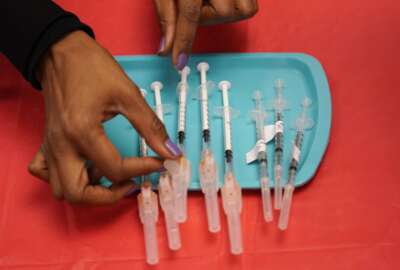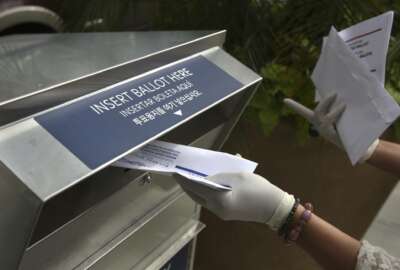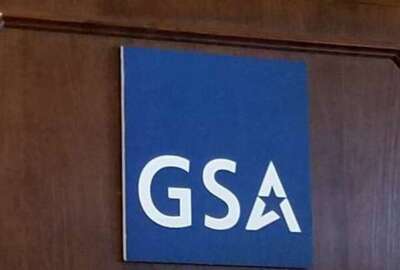
Veterans Affairs gearing up to offer COVID-19 booster shots to vets and employees
In today's Federal Newscast, the Department of Veterans Affairs says it's ready to offer COVID-19 booster shots to veterans and employees who have received their...
To listen to the Federal Newscast on your phone or mobile device, subscribe in PodcastOne or Apple Podcasts. The best listening experience on desktop can be found using Chrome, Firefox or Safari.
- The Department of Veterans Affairs said it’s ready to offer COVID-19 booster shots to veterans and employees who have received their first vaccine doses six months ago or longer. It’ll prioritize those 65 and older, long term care residents and individuals between ages 50 and 64 with underlying medical conditions. VA said it’ll expand to veterans and their families of all ages if supplies allow. The department will contact eligible veterans who receive their care from VA about the booster shots. Others who don’t have medical records with VA with should contact the department for more information. The Food and Drug Administration has authorized only the Pfizer vaccine as a booster shot.
- Federal contractors have their own deadline for complying with President Biden’s vaccine mandate. Federal contractors must be fully-vaccinated by December 8th. Like federal employees, they must show proof of vaccination. Contractors are also eligible for reasonable accommodations if they have an approved medical or religious exception. The Biden administration said contractors are responsible for collecting proof of vaccination and granting accommodation requests. The new safety protocols apply to all contractor employees, even those who aren’t working on a specific government contract. Teleworking contractors are also covered under the new policy. (Federal News Network)
- The Postal Service met its peak season hiring goal at the end of last year. Its inspector general said it’s the first time USPS reached its goals over the past few years. This year’s peak hiring season however, extended through the end of March, instead of Jan. 1, because of the COVID-19 pandemic. USPS hired more than 48,000 employees during last year’s peak season. Agency management disagrees with the IG’s claim that it didn’t meet hiring goals in prior years.
- The first update to the grants shared services offering will be ready in fiscal 2022. The three legacy federal shared service providers of grants management will be part of the initial launch of the new quality service management office (QSMO) marketplace. The departments of Education and Health and Human Services and the National Science Foundation will begin offering the new technology and business process standards by mid fiscal 2022. Then the HHS-led QSMO will begin to bring on private sector providers. The overall goal is to consolidate and standardize the more than 300 grants management systems across the government over the next decade.
- An online directory of executive branch appointees is another step closer to reality. The provision requiring an online version of the PLUM book made it into the House-passed version of the defense authorization bill. The provision came from Oversight and Reform Committee Chairwoman Carolyn Maloney (D-N.Y.) and Rep. Gerry Connolly (D-Va.) and John Sarbanes (D-Md.). The Office of Personnel Management currently publishes a list of political appointees every four years. But the list is only a representative snapshot in time. It doesn’t document appointees who come and go in real time.
- Annual budget justifications should get a little easier to find, now that President Joe Biden has signed a bill into law. The Congressional Budget Justification Transparency Act requires agencies publish easily understandable versions of their annual budget justification to a single government website. The law requires the Office of Management and Budget to keep an updated list of agencies that are expect to submit budget justifications. Agencies will also have to post a plain language version to their own sites.
- A Senate bill would create tighter coordination between U.S. Cyber Command and the private sector. The Armed Services Committee’s version of the defense authorization bill would require CYBERCOM to set up a voluntary process for engaging with the commercial information technology and cybersecurity companies. The committee wants the command and the private sector to team up in protecting against foreign malicious cyber actors. CYBERCOM and the National Security Agency have sought to work more closely with the private sector in recent years after the Snowden revelations led to an icy relationship between the tech industry and government.
- The Department of Homeland Security would establish new testing centers to evaluate the cybersecurity of critical devices and technologies under a bill approved by the House. An amendment to the House-passed defense authorization bill would require DHS to set up four Critical Technology Security Centers. They would focus on testing technologies that underpin national critical functions, which include activities ranging from electricity distribution to internet routing services. Initial funding for the centers would start at $40 million in 2022.
- The Air Force said its pilot production numbers are remaining steady despite challenges caused by the COVID-19 pandemic. The service produced 1,263 new pilots last year, about 16 less than in 2019. The Air Force expects to increase output by about 100 in 2021. The force is still dealing with a pilot shortage and has had to make some changes to retain pilots. The service is trying to be more flexible in its training to get people through the pipeline faster.
- The Defense Department has a drug problem, but it’s not what you think. The Pentagon provides much needed medicine to millions of Americans, but a new report finds the supply of those drugs may be in jeopardy. The Defense Department Inspector General said the military relies heavily on other countries to provide pharmaceuticals for service members and their families. In a report, the IG found that DoD doesn’t have a strategy to buy needed drugs if there was a supply chain disruption. Furthermore, DoD often buys its drugs last minute, meaning the medicine could quickly become sparse. (Federal News Network)
- The Pentagon and the Energy Department have opened up public comment on technologies that might let the military power its facilities with small, portable nuclear reactors. DoD wants to build a prototype reactor at the Idaho National Laboratory, capable of generating up to five megawatts of electricity. The agencies expect to make a decision on whether or not to move forward with the project by early next year. (Federal News Network)
- At some agencies almost a third of all comments on proposed regulations may not have come from the person associated with the email address attached to the submission. A new report from the Government Accountability Office found a wide disparity among agencies’ ability to verify or even collect data on commenters. GAO looked at 10 agencies who received comments over a four year period and saw some agencies were able to verify almost 90% of commenters, while others struggled. GAO made 10 recommendations to the agencies, mostly focusing on working with Regulations.gov to fully describe available public comment data, including any limitations, to external users of the data.
Copyright © 2025 Federal News Network. All rights reserved. This website is not intended for users located within the European Economic Area.
Eric White
Eric White is news anchor and Federal Drive producer at Federal News Network.
Follow @FEDERALNEWSCAST
Related Stories





